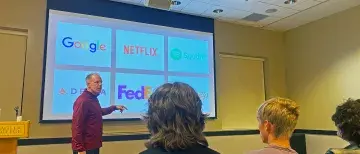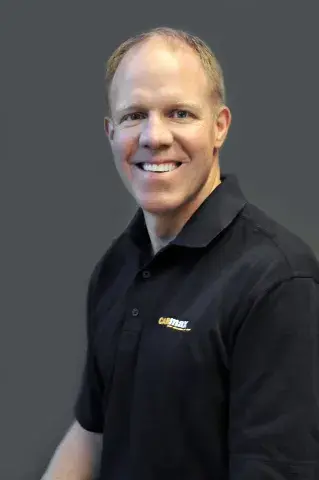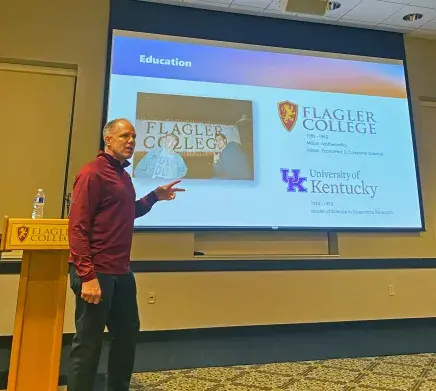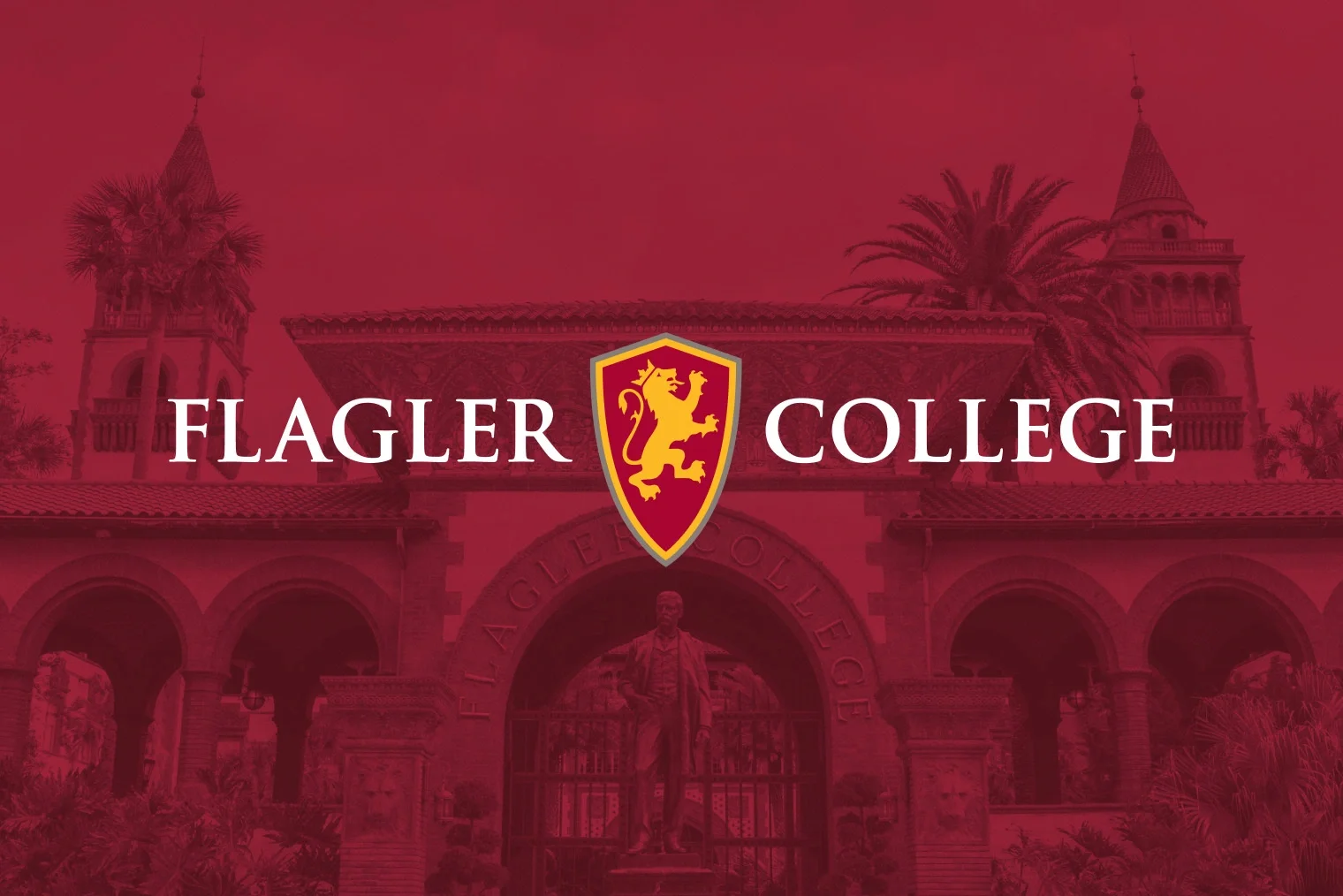
Daniels, senior vice president of CarMax in the Auto Finance division, graduated with his degree in Mathematics from Flagler College in 1993. Reflecting on the value of his Flagler education, Daniels assured the students that their education here is fully preparing and priming them to be successful in whatever career path they choose.
“Don't think that because you're not going to Harvard or you're not going to Yale or you're not at the most intense academic school possible, you're not getting what you need to succeed out there in this world,” Daniels said. “I promise you, that is not the case.”

Translating a Passion for Math into Real-world Impact
With students from Flagler’s Math & Technology program and other adjacent “quantitative majors” in mind, Daniels focused part of his presentation on where he sees the practical application of math, statistics, economics, and data science in today’s business world.
A common career path for math majors is becoming an analyst, a profession needed in many industries. Daniels got his start as a market research analyst with AT&T Universal Card.
Giving examples from his experience in the credit card industry and time at CarMax, Daniels gave students a new perspective on the concepts they might otherwise see in their coursework as largely theoretical.
Daniels gave a current example of one math problem his analysts, a position recent college graduates often fill, are expected to work on ahead of the company’s next earnings call with the CEO: How are the student loan repayment requirements affecting CarMax loan borrowers?
He said CarMax’s retail-side presents its own real-world math problems like: With 60,000 cars, how do you price each at any given time? Or: How do you get all the right cars to each store, and do that optimally?
Practical Advice for Selling Your Skills and Personalizing Your Professional Path
While Daniels attended graduate school, earning a master's degree in operations research from the University of Kentucky, he underscored the reality that students can and should tailor their professional path to individual goals and desires. He said CarMax and many other successful companies hire students out of undergraduate math programs with an equal perspective to those coming out of graduate or Ph.D. programs.
Presentation slide about companies that hire from math programs
To help students succeed regardless of their plans after graduating from Flagler, Daniels spoke from experience and gave an inside scoop on what to expect when applying to analyst positions at Fortune 500 companies:
Phone Screening

To get a jumpstart on finding positions that appeal to you, he recommended looking directly on company websites and starting with Fortune 100 Best Companies to Work For, “companies that people say they love to work for.” After applying, Daniels said to expect a request for a phone screen.
“They're going to ask you a math problem, an algebra problem,” Daniels said. “Keep your head straight. Get a good night's sleep. Think, ‘If you can do math [at Flagler], if you can do calc. two, you can do this problem.”
On-site Company Visit
If you “knock that out of the park,” Daniels said the next step is for companies to bring you on site.
“They're going to probably give you two case questions,” he said. Something that might initially throw you off, like, “How many gas stations are in the U.S.?”
He said the key to answering these case questions is to really engage analytically. If both questions go well, you’ll have a behavioral interview with prompts like, “Tell us about a time you overcame adversity.” This is something Daniels encourages students to take advantage of the Career Development Center to prepare for.
Four Practices to Prioritize While Interviewing, and After You’ve Secured the Job
Daniels has interviewed thousands of people and hired hundreds.
“I’ve seen many succeed, and I’ve seen many crash and burn over the years,” he said.
He believes the important thing during these on-site interview visits and once you’ve secured a job is your ability to do four key things:
Be smart: Answer the phone screen and case questions well. Always engage your analytical skills.
Be prepared: Get a good night’s sleep and do your research.
When they ask if you have any questions during the interview, Daniels said you won’t ask about how many PTO you get, “you're going to ask a thoughtful question about the company.”
Communicate: Engage and have discussions
“You’re going to engage,” Daniels said. “When they do the case question, you're going to have a discussion with them. You're going to talk with them. We want to know you can communicate.”
Delight: When you show up, how are you going to stand out?
At his interview for his first professional role, Danield brought a bound booklet with his resume, letters of recommendation, and an example of practical research.
“Nobody read it. But everybody, when I got that job said, wow, I remember this,” Daniels said. “So, the question is, how are you going to stand out to us?”
A stand-out interview memory for Daniels was when a candidate revealed that she could do 20 pull-ups saying, “I just wanted to, and I couldn’t do any.” So, one pull-up at a time, she trained to hit 20.
“I was sold, and she stands out to me like nobody else,” he said.
Paying it Forward
Grateful for the foundation Flagler College laid in his career, Daniels and his family continue to be generous donors to the College.
One way he gives back is through the Jon Daniels Family Endowed Scholarship for mathematics students, or students in similar fields. Some of those scholarship recipients were in attendance at his presentation.
“When I was a college kid, I was poor,” Daniels said. “Flagler gave to me when I didn’t have any money. I’ve now given to Flagler and will continue to give to them as long as I can.”



